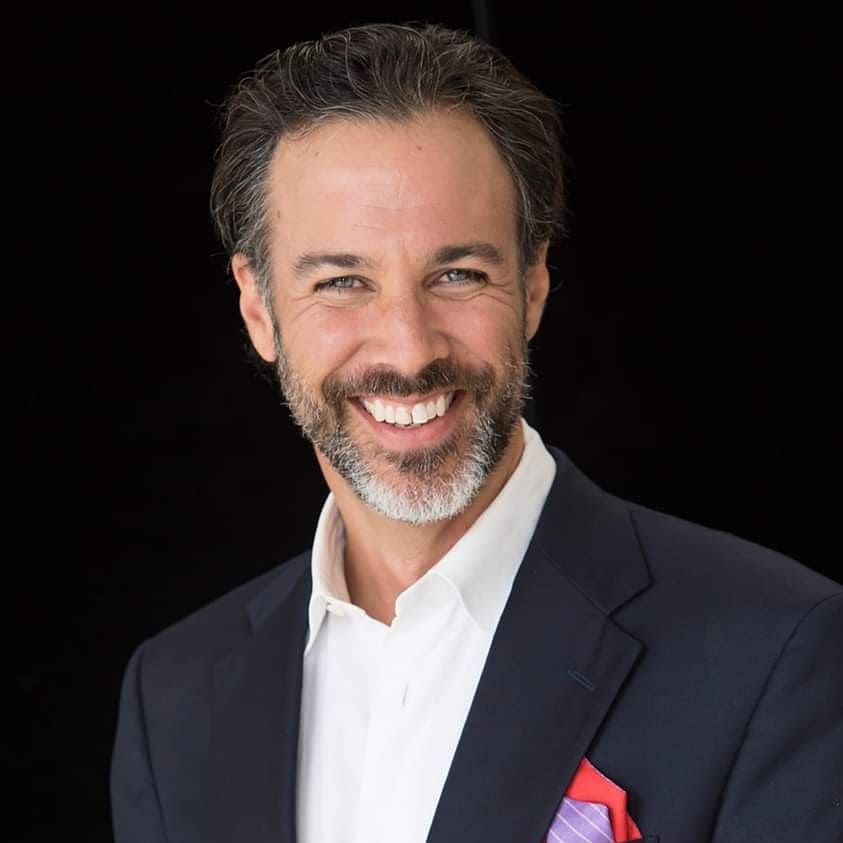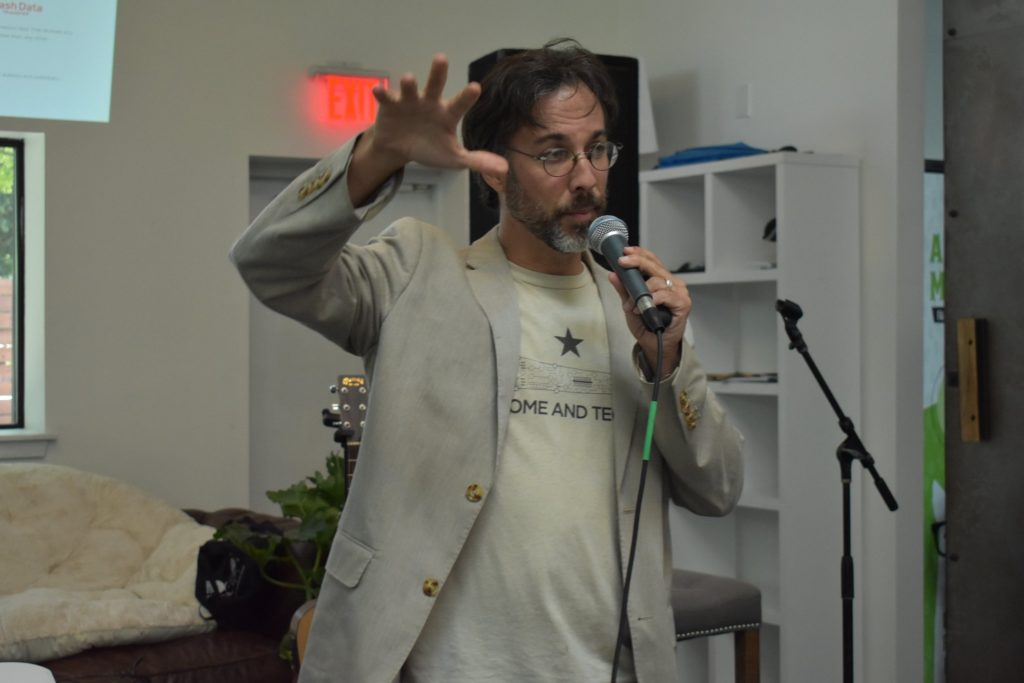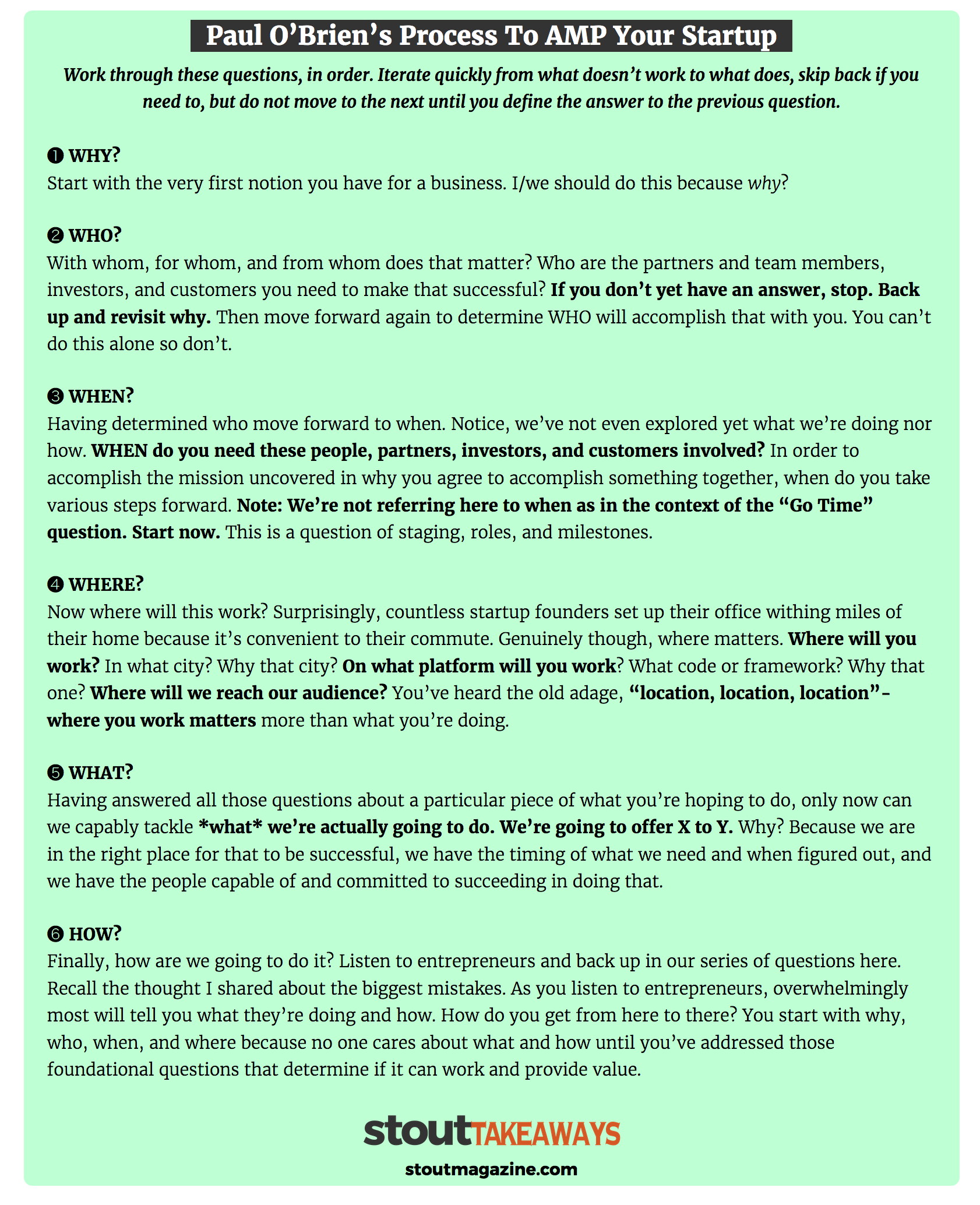
Leaders Speak: Paul O’Brien On How To Amplify & Accelerate Ideas

Stout words from local trailblazers to global thought leaders.
Ready. Set. GO.
Paul O’Brien, CEO, MediaTech Ventures and Director, Founder Institute, talks with Stout about what it takes to amp up and accelerate your next idea.

Paul O’Brien, founder and CEO of MediaTech Ventures, Director for Texas of the global startup incubator Founder Institute
What’s the best strategy to AMP up an idea/team/biz?
Start with Why. It’s a common trope, particularly if you’re a student of Simon Sinek; and yet, I find among entrepreneurs and founders that it’s a lesson very rarely practice. And in my experience, that simple shift in behavior is the cause of the majority of failed ideas, teams, and businesses.
Start with why. Not with who (yourself or customers) and not with what (the product, problem, or solution), as most founders speak they have a tendency to talk about themselves and their passion to deliver *this* solution to *those* people. And the typical and completely understandable response to such communication is either, “I don’t care,” or “prove first that you can do that. We hear that “advice” in startup communities almost endlessly: prove to me that you can do that. We hear that because people communicate what, how, and for whom they intend to solve a problem. And the natural tendency of anyone hearing that ambition is to seek evidence. After all, what you’re doing is so new, either as an idea or a business, if you’re so convicted about solving that problem, show me that you are. That’s not how to inspire. That’s now how to AMP.
Start with Why– Because we should. Because it creates value. Because we can. Because we can, with you.

Paul O’Brien kicking off Collective’s Second Cohort at Work Well Co-working East Austin.
The key to being successful as a startup founder is appreciating that the time to start is now and the time to quit is never.
-Paul O’Brien
How do you know when it’s go time? What are biggest mistakes you see here?
It’s always go time. Truly. As entrepreneurs, we’ve taken on the career of tackling failures and gaps in our economy. That’s what defines “entrepreneur.” People starting businesses already known to succeed, and how, are business owners. It’s time to start a business *when* we have the capital, the team, or the other resources need to start that business. Asking when is apropos for such businesses as what to do and how is known.
The biggest mistake I see in the startup community, with completely new and innovative ideas, is that we have this notion that ‘timing’ is a substantial question. It’s not. Because in such work, we’re constantly seeking not to start what’s known to work but how to overcome what doesn’t work so as to start something new. Doing that starts now and it never stops.
And that’s the second biggest mistake I see: Startup founders who aren’t in it for life. You can’t bring a completely new idea to life, constantly overcoming adversity and failure, and persevering over and beyond the constant course corrections, if you’re willing to just quit. To stop. Entrepreneurship never stops, it’s the work of tackling failures and gaps – such things now and will always exist. The key to being successful as a startup founder is appreciating that the time to start is now and the time to quit is never.

Click to download your copy of Paul O’Brien’s AMP Your Startup List
How do you get from here to there? Who’s a good example of making this happen?
Why, who, when, where, what, how. Constantly work through that series of questions, in that order, and iterate quickly from what doesn’t work to what does. That process starts now and it never ends.
See the Stout Takeaways here for details on Paul’s process or click to download your copy of Paul O’Brien’s AMP Your Startup List.
What do you do if you are stuck? Or how to you remove blocks and obstacles?
Not to sound like a broken record but circle back to the beginning of that methodology. If you’re stuck it’s because someone doesn’t understand or agree with why – and that someone may very well be you. Work through the cycle again and ensure that you have answers to all the questions.
Entrepreneurship never stops, it’s the work of tackling failures and gaps.
-Paul O’Brien
Entrepreneurship is a matter of addressing the failures and gaps. Appreciate that that’s the job! This line of work is NOT the same nor as simple as starting a business, there is no book, guide, or set roadmap to follow. If you’re stuck, appreciate that you’re actually on the right track because being stuck means you’ve uncovered one of those failures or gaps that someone else hasn’t already worked through. Back up and find the path forward.
What is the current climate? Who/which industries are most ripe for acceleration now?
Society loves to explore the most innovative of ideas and futuristic possibilities: blockchain, AI, VR, AR, and the like. These ideals flood our worldview with idealism of what the future holds but in doing so, they overshadow the more practical industries and innovations at the turning point of acceleration.
Where might we really see desperately needed innovation?
• Workforce solutions
The world is increasingly freelance, fractional, and remote, and yet society has yet to address that business setup, legal protections, healthcare, insurance, taxes, and more are designed for companies.
• Education
Not online media being the future of education but rather a reverting to the fact that overwhelmingly most need not go into tens of thousands of dollars (or more) of debt to be invaluably productive in society after 4 years in college. The world is experiencing nursing, coding, construction, robotics and manufacturing, and even data science jobs, and few of those require a college degree yet trade schools have all but disappeared from our economy.
• Media
Fake news; musicians struggling to make a living; photographers dealing with copyright infringement… we need not look far to see that “Silicon Valley” broke (innovated) the way our media industries work, and decades later we’re still wrestling with how to make sure creators get paid. That’s millions of jobs in our economy and more importantly, those are the skills at the heart of what creates the culture, inspires, and communicates our world. Without this workforce thriving, our entire way of life is in peril to corporate commercialization of culture, and a loss of what makes us human: why. Technology in media comprises the largest share of venture capital investment in the world – why? Because there is an entire market that is under monetized, under utilized, and misunderstood, thanks to the disruption of the internet. Let’s fix that.
Want more?
Check out all our Stout Leaders Speak articles for more innovative insights into success from local trailblazers to global thought leaders.
